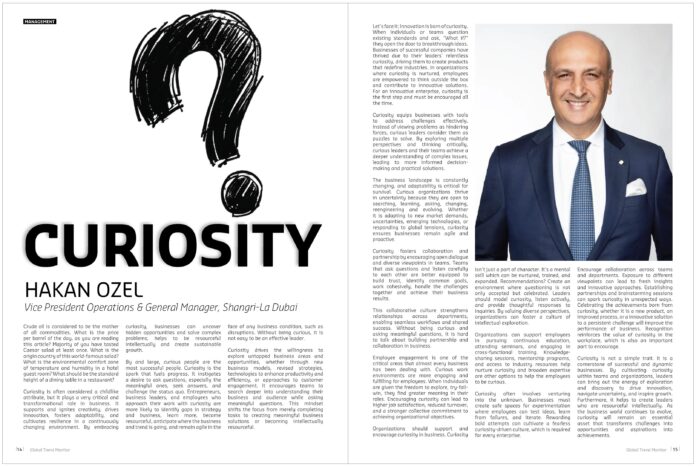Hakan Ozel, Vice President Operations & General Manager, Shangri-La Dubai
Crude oil is considered to be the mother of all commodities. What is the price per barrel of the day, as you are reading this article? Majority of you have tasted Caesar salad at least once. What is the origin country of this world-famous salad? What is the environmental comfort zone of temperature and humidity in a hotel guest room? What should be the standard height of a dining table in a restaurant?
Curiosity is often considered a childlike attribute, but it plays a very critical and transformational role in business. It supports and ignites creativity, drives innovation, fosters adaptability, and cultivates resilience in a continuously changing environment. By embracing curiosity, businesses can uncover hidden opportunities and solve complex problems; helps to be resourceful intellectually and create sustainable growth.
By and large, curious people are the most successful people. Curiosity is the spark that fuels progress. It instigates a desire to ask questions, especially the meaningful ones, seek answers, and challenge the status quo. Entrepreneurs, business leaders, and employees who approach their work with curiosity are more likely to identify gaps in strategy and business, learn more, become resourceful, anticipate where the business and trend is going, and remain agile in the face of any business condition, such as disruptions. Without being curious, it is not easy to be an effective leader.
Curiosity drives the willingness to explore untapped business areas and opportunities, whether through new business models, revised strategies, technologies to enhance productivity and efficiency, or approaches to customer engagement. It encourages teams to search deeper into understanding their business and audience while asking meaningful questions. This mindset shifts the focus from merely completing tasks to creating meaningful business solutions or becoming intellectually resourceful.
Let’s face it: Innovation is born of curiosity. When individuals or teams question existing standards and ask, “What if?” they open the door to breakthrough ideas. Businesses of successful companies have thrived due to their leaders’ relentless curiosity, driving them to create products that redefine industries. In organizations where curiosity is nurtured, employees are empowered to think outside the box and contribute to innovative solutions. For an innovative enterprise, curiosity is the first step and must be encouraged all the time.
Curiosity equips businesses with tools to address challenges effectively. Instead of viewing problems as hindering forces, curious leaders consider them as puzzles to solve. By exploring multiple perspectives and thinking critically, curious leaders and their teams achieve a deeper understanding of complex issues, leading to more informed decision-making and practical solutions.
The business landscape is constantly changing, and adaptability is critical for survival. Curious organizations thrive in uncertainty because they are open to searching, learning, asking, changing, reengineering and evolving. Whether it is adapting to new market demands, uncertainties, emerging technologies, or responding to global tensions, curiosity ensures businesses remain agile and proactive.
Curiosity fosters collaboration and partnership by encouraging open dialogue and diverse viewpoints in teams. Teams that ask questions and listen carefully to each other are better equipped to build trust, identify common goals, work cohesively, handle the challenges together and achieve their business results. This collaborative culture strengthens relationships across departments, enabling seamless workflows and shared success. Without being curious and asking meaningful questions, it is hard to talk about building partnership and collaboration in business.
Employee engagement is one of the critical areas that almost every business has been dealing with. Curious work environments are more engaging and fulfilling for employees. When individuals are given the freedom to explore, try-fail-win, they find greater meaning in their roles. Encouraging curiosity can lead to higher job satisfaction, reduced turnover, and a stronger collective commitment to achieving organizational objectives.
Organizations should support and encourage curiosity in business. Curiosity isn’t just a part of character. It’s a mental skill which can be nurtured, trained, and expanded. Recommendations? Create an environment where questioning is not only accepted but celebrated. Leaders should model curiosity, listen actively, and provide thoughtful responses to inquiries. By valuing diverse perspectives, organizations can foster a culture of intellectual exploration.
Organizations can support employees in pursuing continuous education, attending seminars, and engaging in cross-functional training. Knowledge-sharing sessions, mentorship programs, and access to industry resources help nurture curiosity and broaden expertise are other options to help the employees to be curious.
Curiosity often involves venturing into the unknown. Businesses must create safe spaces for experimentation where employees can test ideas, learn from failures, and iterate. Rewarding bold attempts can cultivate a fearless curiosity-driven culture, which is required for every enterprise.
Encourage collaboration across teams and departments. Exposure to different viewpoints can lead to fresh insights and innovative approaches. Establishing partnerships and brainstorming sessions can spark curiosity in unexpected ways. Celebrating the achievements born from curiosity, whether it is a new product, an improved process, or a innovative solution to a persistent challenge will improve the performance of business. Recognition reinforces the value of curiosity in the workplace, which is also an important part to encourage.
Curiosity is not a simple trait. It is a cornerstone of successful and dynamic businesses. By cultivating curiosity within teams and organizations, leaders can bring out the energy of exploration and discovery to drive innovation, navigate uncertainty, and inspire growth. Furthermore, it helps to create leaders who are resourceful intellectually. As the business world continues to evolve, curiosity will remain an essential asset that transforms challenges into opportunities and aspirations into achievements.
#GTM #GlobalTrendMonitor #HakanOzel #Magazine #ExpertOpinion #PowerOfCuriosity #InnovateWithCuriosity #BusinessMindset #LeadershipDevelopment #CreativeThinking #AgileLeadership #CuriosityDriven #FutureOfWork #ResilientOrganizations #IntellectualResourcefulness
